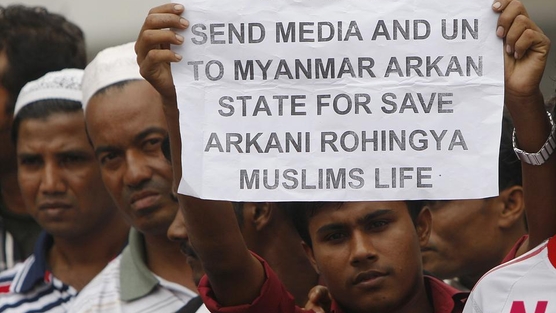Muslim nations must move to stop Rohingya massacre

 A political analyst says the UN and the international community including the Muslim nations must put pressure on Myanmar government to end the ongoing violence against Rohingya Muslims in the Southeast Asian country.
A political analyst says the UN and the international community including the Muslim nations must put pressure on Myanmar government to end the ongoing violence against Rohingya Muslims in the Southeast Asian country.
The comments came after the United Nations said there are reports showing the government of Myanmar has been involved in recent deadly violence against Rohingya Muslims. This is while Muslim leaders in Myanmar have also criticized state officials for failing to act against deadly attacks on country’s Muslims, blaming security forces for standing by as assailants go on rampage.
Press TV has conducted an interview with James Jennings, president of Conscience International, to further discuss the issue. What follows is an approximate transcription of the interview.
Press TV: James Jennings, a few months back when these clashes were reported, it was also reported that government forces were standing by as these Buddhists were attacking these Muslim minority population homing in on the Rohingyas and in some cases they were participating in that and now you have the President Thein Sein saying, he was threatening to use force. What is exactly going on here?
Jennings: Well first of all Myanmar is a very important country in South East Asia. That is demonstrated by the fact that one of the first trips that Obama has made in his second term was to Myanmar to consolidate that relationship but within the country there are many, many problems and after discussing the very critical issue on the Korean Peninsula, I hesitate to say that the difficulties in Myanmar will be with us for a very long time.
Right now the majority Buddhist population has several minority problems that they are dealing with. One of them is with the Rohingya Muslims. And the real, heart of the problem there is that the Rohingyas have not been accredited status within the country of Myanmar or Burma and without that citizenship status, I am afraid that not only the persecution but the repression and then the ethnic violence will continue.
Press TV: Well since you talked about the US, we know that Myanmar shares a border with China and they are obviously establishing some military bases there.
Is the US looking at Myanmar and not coming down on the government as hard as they should based on the strategic importance that it plays vis-à-vis China?
Jennings: Well it is a delicate balance with the new government that is emerging. You must remember we had over 50 years of military dictatorship, a closed country and now that is changing with the leadership of Aung San Suu Kyi but I do not think that either the government there is stable enough or the US influence is strong enough to really make a difference at this point.
And when we just recently heard a retrospective on the Vietnam War and many of the military officers from the US force were saying that certainly that was a failure and a failure of political imagination to begin with that we do not want to see the same kind of relationship in South East Asia again.
But Myanmar is certainly an important country. It has many ethnic minorities. Right now the central government is fighting. They are catching rebellions, the Kachins on the East bordering to China and also in the South of the country, the Karens.
This is really delicate and difficult problem. We do not want to see a repetition of what happened in Vietnam but it is not easy to sort it out. An US influence so I think is very limited.
Press TV: So who is going to save these Muslims especially the Rohingyas, who is going to come to their rescue?
Jennings: Well I think nobody is going to come to their rescue right now except, unless the international community and I think it is better for the UN and the international community including the Muslim nations to try to use influence on the central government to ease what is happening against the Rohingyas which is really outrageous.
They are being treated not as a minority but as non-existent persons and that is where the danger comes of what we have already seen the displacement of people, also the killing of many of those people and the unrest is not lessening right now, it is actually increasing with the majority Buddhist population getting very involved in the issue.







